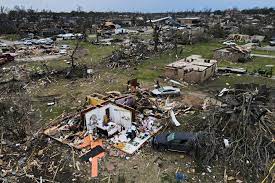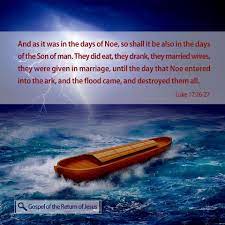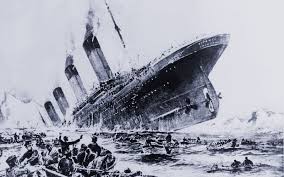

Almost every one of us, especially--when we are young--thinks himself especially privileged--a favorite child of God exempted from trouble---while others are probably not. The daily news can't help but cause us some distress--though we tend to insulate ourselves from the sufferings of others, or to try to forget as soon as possible the terrible things that happen to people. Yet eventually each of us must cope with our own mortality as well as automobile or plane crashes, family tragedies, the death of our parents, friends, or perhaps even our own children. There are very real possibilities of a nuclear war, or a devastating earthquake, flood, or hurricane affecting us as well as our neighbors. Cancer may strike us whether we are young or old, or an unexpected, or we may fall victim to an uninvited auto accident which was the other driver's fault.
A jet aircraft fully loaded with over 300 men, women and children plunges into the ocean minutes after takeoff. All on board are lost. A wide range of people were on board. There were people from half a dozen nations, there were many children. A good number were Christians--most of them had prayed for a safe journey moments before takeoff.

 With almost no warning a violent tornado touches down and plows
a narrow path of total destruction for perhaps 30 miles. Some
homes are totally destroyed and many occupants are killed. Houses
on either side may be left untouched. Destruction may well have
been many millions of dollars. Good Christian families perished
as did agnostics and unbelievers, ordinary citizens and town drunks.
With almost no warning a violent tornado touches down and plows
a narrow path of total destruction for perhaps 30 miles. Some
homes are totally destroyed and many occupants are killed. Houses
on either side may be left untouched. Destruction may well have
been many millions of dollars. Good Christian families perished
as did agnostics and unbelievers, ordinary citizens and town drunks.
Why did our son die in war as a mere youth while the soldier
from down the street has been allowed to a live to ripe old age?
What went wrong? Where was God when this happened? Did He lose
control? Was God powerless to intervene?
During World War II German bombs pummeled London night after night for several years, killing many thousands. Most of the people who died were innocent civilians, many were strong Christians. Why were their lives cut suddenly short for no good reason?
According to the Duxfords library, the Blitz was in three main phases. The figures for the first part of August 1940 to May 10th 1941--and not including the Baedeker raids nor the mini blitz--were: For London: Casualties were: 43,000 Killed, 51,000 Seriously injured, 88,000 Slightly injured. Prewar estimates had calculated that 600,000 would be the possible number of people killed and 1,200,000 would be injured. Again Prewar estimates had suggested 700 tons of bombs / day from the combined bomber forces but this was wildly inaccurate and it was in fact closer to 400 tons of bombs/day. By the end of the first phase it was estimated that 18,000 tons of bombs had fallen on London, thus there was to be five casualties for every ton of bombs that fell on London. To get an exact figure as to how many tons fell is almost impossible. What was the tonnage that each aircraft carried. What type of bombs were they carrying. How many aircraft failed to jettison or drop their bombs on targets. How many Messerschmidt Bf109 and Bf110 aircraft were carrying bomb loads.
In 1755 a great earthquake off the coast of Portugal caused a tsunami and fire in Lisbon, Portugal
"In all more than 60,000 people died in the disaster in Lisbon alone. Thousands more died in other areas. The quake was felt throughout Western Europe and Northwestern Africa. Many people thought that the quake was a result of an angry God responding to Lisbon's "sinful" ways. However, they were hard put to explain why one city was destroyed while others, just as "sinful" were spared. There were some, however, who studied the earthquake objectively, observing the direction of the shocks, sequence of events and other details to try to understand scientifically what was going on. In the end, the scope of the destruction was such that the country turned its attention to rebuilding Lisbon. Although nobody could replace what had been lost, the city rose again in beauty and grandeur." (http://www.olympus.net/personal/gofamily/quake/famous/lisbon.html)
Was God so busy with other affairs that He overlooked these awful tragedies? Why is He so uninvolved, so seemingly remote and uncaring? Does He lack the power or motivation to prevent disasters? Is He arbitrary and cruel? Do some things get out of even His control?
 A recent issue of National Geographic contains vivid pictures
of the sudden destruction of Pompeii, a reminder that we easily
forget the disasters that have already overtaken whole cities
in earth's history. Many scoff at the flood of Noah, though Jesus
Himself said that it had occurred in human history, wiping up
millions if not billions of human beings in a flash--all except
for eight persons. How do we know we won't "die before our
time"--according to the plan and "providence" of
God?
A recent issue of National Geographic contains vivid pictures
of the sudden destruction of Pompeii, a reminder that we easily
forget the disasters that have already overtaken whole cities
in earth's history. Many scoff at the flood of Noah, though Jesus
Himself said that it had occurred in human history, wiping up
millions if not billions of human beings in a flash--all except
for eight persons. How do we know we won't "die before our
time"--according to the plan and "providence" of
God?
How do we handle the news that a close young friend or relative has just been killed in an terrible accident, or taken from us by a sudden illness---just when everything seemed all set up for their happiness and well-being and a fulfilling earthly existence? The athlete just starting his college career, well-liked an popular, a gifted student and a new Christian? Dead at 19 from a sudden infection, ordinarily one easy to cure. A married man suddenly killed in a plane crash leaving a young wife and four small children, all believers in Jesus with nothing out of order in their lives and marriage? Why? Why, O God?
Then there are the dirty old men, crooks, politicians, atheistic scientists and professors who live to be 90, apparently happy and unjudged, destroying people right and life with their corrupt ideologies and anti-God propaganda. In our world all sorts of criminals go Scott-free or suffer little for the grievous hurts they cause others. Where do you find an honest lawyer, a fair judge and an impartial jury? Who defends the widow and protects the young?
By human standards life is unfair and God is silent just when we desperately need to hear His explanation for disasters which may affect us the rest of our lives. Where is justice and where can we find peace, hope, and content in such an uncertain and unjust world?
We live in a fallen world. Most of the inhabitants of our world are living life-styles of indifference to the design and plan and wishes of their Creator. In such a world any of us can be victims as well as perpetrators of wrong. In such a world the forces of nature can become unbalanced by human activity which ignores God. It is very difficult to trace cause and effect in many events which happen to us, apparently out of nowhere, for no discernible reason.
 For centuries, ship owners and maritime insurance firms have
reserved a category of marine disasters called "Acts of God,"
to take into account that there are many situations where only
God knows why something bad happened to their ship at sea.
For centuries, ship owners and maritime insurance firms have
reserved a category of marine disasters called "Acts of God,"
to take into account that there are many situations where only
God knows why something bad happened to their ship at sea.
A whole generation of strong young men are drafted, trained, and sent off to war. Many do not return but die in the service of their country. Did God ignore their plight and pass over them? What about those who called out for help? Was God listening? Did He do anything to save any of them? (It is said "there are no atheists in foxholes.")
God DOES know. He is responsible for everything that happens on earth and in heaven. However, He does not give briefings and usually does not explain Himself--until we meet Him in the next life. Our comfort in the here-and-now comes from knowing the Lord personally, from appreciating His character in day to day experience.
The LORD, the LORD, a God merciful and gracious, slow to anger, and abounding in steadfast love and faithfulness, keeping steadfast love for thousands, forgiving iniquity and transgression and sin, but who will by no means clear the guilty, visiting the iniquity of the fathers upon the children and the children's children, to the third and the fourth generation. (Exodus 34:6, 7)

![]()
"...we are not living in a world where we can always expect perfection; that God does not try to operate the world in such a way that everything works out beautifully. We are living in a fallen world. From Genesis to Revelation, the Scriptures declare that we are living in a broken world, a fragmented world, a world which is not what it once was and is not what it shall be. For the present we are afflicted with hurts and damage and injuries and difficulties and hardships. That is part of life today, and it is all a result of the introduction of the principle of human evil, of sin, into human life.The Scriptures confirm that everybody is affected by this principle of human evil. Many of us think we have escaped it because we were not born with evident handicaps. But in fact we all have handicaps. Someone has well said, "When you look at a beautiful athlete" (such as we will be seeing in the Olympic Games very shortly -- these fine, handsome, well-coordinated young men and women), "what you are looking at is the ruin of an Adam." Everywhere humanity reflects the weakness of the fall. This is why our minds cannot operate as they should. I tried to quote a poem in the early service and I could not think of the first line. It just fled from me. That shows how sin has attacked me. And you are no better off! But Jesus makes clear that suffering is not always directly traceable to personal sin. Sometimes it is! There are texts in Scripture that clearly indicate that people are hurting and suffering and physically depraved and deprived because of their own evil ways. Ray Stedman, God's Loving Word: Expository Studies in the Gospel of John.
The book of Job is the oldest book in the Bible and is about a very godly patriarch who lived in what is now the country of Jordan. When we first meet Job he is a wealthy, prosperous and a man of impeccable moral character.
There was a man in the land of Uz, whose name Job; and that blameless upright, one who feared God, turned away from evil. There were born to him seven sons three daughters. He had thousand sheep, camels, five hundred yoke oxen, she-asses, very many servants; so this greatest all people east. His used go hold feast house each on day; they would send invite their sisters eat drink with them. when days run course, Job sanctify them, rise early morning offer burnt offerings according number them all; for said, "It may be my have sinned, cursed God hearts." Thus did continually. (Job 1:1-5)
As the story unfolds we find that God allows Satan to test Job to extreme limits:
Job had three close friends who were greatly concerned for Job and his family. These friends were not ignorant of God, but they were also believers as Job was.
What follows in the book of Job are long conversations between Job and this three friends. In turn each of these friends tells Job that the reason for his calamity is related to sin in Job's life. Although Job's friends care for their friend, their answers are incorrect. God Himself makes it known that Job is (and was all along) blameless and righteous before Him. The LORD finally tells specifically of His displeasure at the inappropriate advice Job was given by his well-meaning friends.
"My wrath is kindled against you and against your two friends; for you have not spoken of me what is right, as my servant Job has. Now therefore take seven bulls and seven rams, and go to my servant Job, and offer up for yourselves a burnt offering; and my servant Job shall pray for you, for I will accept his prayer not to deal with you according to your folly; for you have not spoken of me what is right, as my servant Job has." So Eliphaz the Temanite and Bildad the Shuhite and Zophar the Naamathite went and did what the LORD had told them; and the LORD accepted Job's prayer. And the LORD restored the fortunes of Job, when he had prayed for his friends; and the LORD gave Job twice as much as he had before. Then came to him all his brothers and sisters and all who had known him before, and ate bread with him in his house; and they showed him sympathy and comforted him for all the evil that the LORD had brought upon him; and each of them gave him a piece of money and a ring of gold. And the LORD blessed the latter days of Job more than his beginning; and he had fourteen thousand sheep, six thousand camels, a thousand yoke of oxen, and a thousand she-asses. He had also seven sons and three daughters. And he called the name of the first Jemimah; and the name of the second Keziah; and the name of the third Keren-happuch. And in all the land there were no women so fair as Job's daughters; and their father gave them inheritance among their brothers. And after this Job lived a hundred and forty years, and saw his sons, and his sons' sons, four generations. And Job died, an old man, and full of days. (Job 42:7-17)
The reality of the story of Job is that God allowed Job's suffering as a test and as a means of deepening Job's character and relationship with God. There was no relationship between Job's suffering and his standing before God and his moral behavior. He was blameless from start to finish. This example tells us that we can easily rush to unwarranted conclusions when adversity happens to an individual or a group of people.
Sometimes God does speak specifically about a coming disaster which will be a judgment on His people, or one of His enemies. An example of this kind of relatively rare situation would be the destruction of Jerusalem by Nebuchadnezzar in 586 BC. The fact that this would happen was the subject of many warnings from the prophets for at least 150 years ahead of time. The Book of Nahum is a second example: the prophet clearly warns Ninevah that judgment is about to fall on the Assyrians after a long season of God's grace which began when Jonah preached there and the king and people repented.
However, unless God directly tells us that an accident, sickness, or a financial setback in the life of an individual, or that a hurricane, earthquake, flood, plague, or war was sent to a nation by God as a judgment for sin, we are presumptuous to say that any disaster has a direct causal connection to a nations' behavior.

Actually Jesus Himself did comment on the kinds of disasters and accidents and tragedies that befall us in life. He gave a startling answer to the question "Why did God allow such a terrible thing to happen?"
Luke 13 gives the account. Jesus was asked about a tragedy in the temple in Jerusalem when Pilate had brutally killed some devout Jewish worshipers at the time of the temple daily sacrifice, mingling their blood with that of the sacrificed animals:
"...Do you think that these Galileans were worse sinners than all other Galileans, because they suffered thus? I tell you, No; but unless you repent you will all likewise perish. Or those eighteen upon whom the tower (under construction) in Siloam fell, and killed them all, do you think they were worse offenders than all the others who dwelt in Jerusalem? I tell you, No; but unless you repent you will all likewise perish." (Luke 13:1-5)
The answer Jesus gave is very surprising. Jesus did not apologize for either incident. God had not lost control. Neither did He assign any blame. In a fallen world, innocent people suffer and die. There is no safe place in this present life. There are no guarantees. Jesus does not promise His followers good health, a long life, and material riches. It is more likely Christians will find trouble, adversity, opposition, and trials, but they will inherit the kingdom of God. The only sure refuge is one's relationship with God. Jesus said the most important thing in life was to repent--that is, to be in a right relationship with God at all times.
"I tell you, my friends, do not fear those who kill the body, and after that have no more that they can do. But I will warn you whom to fear: fear him who, after he has killed, has power to cast into hell; yes, I tell you, fear him! Are not five sparrows sold for two pennies? And not one of them is forgotten before God. Why, even the hairs of your head are all numbered. Fear not; you are of more value than many sparrows. "And I tell you, every one who acknowledges me before men, the Son of man also will acknowledge before the angels of God; but he who denies me before men will be denied before the angels of God. And every one who speaks a word against the Son of man will be forgiven; but he who blasphemes against the Holy Spirit will not be forgiven. And when they bring you before the synagogues and the rulers and the authorities, do not be anxious how or what you are to answer or what you are to say; for the Holy Spirit will teach you in that very hour what you ought to say..."
And he told them a parable, saying, "The land of rich man brought forth plentifully; and thought to himself, `What shall I do, for have nowhere store my crops? said, `I will do this: pull down barns, build larger ones; there all grain goods. say soul, you ample goods laid up many years; take your ease, eat, drink, be merry.' But God said him, `Fool! This night soul is required you; the things prepared, whose they be?' So who lays treasure not toward God."
And he said to his disciples, "Therefore I tell you, do not be anxious about your life, what you shall eat, nor body, put on. For life is more than food, and the body clothing. Consider ravens: they neither sow reap, have storehouse barn, yet God feeds them. Of how much value are birds! which by being can add a cubit span life? If then able as small thing that, why rest? lilies, grow; toil spin; even Solomon in all glory was arrayed like one these. But so clothes grass alive field today tomorrow thrown into oven, will clothe O men little faith! seek eat drink, mind. nations world these things; Father knows that need Instead, kingdom, things yours well. "Fear not, flock, it's good pleasure give kingdom. Sell possessions, alms; provide yourselves with purses grow old, treasure heavens does fail, where no thief approaches moth destroys. is, there heart also. (Luke 12:2-34)
The Hebrew (Old Testament) word for repentance (nachams) means essentially to change one's life style, to turn and go in a different direction. The root means "comfort" suggesting that positive benefits will follow a change of attitude or disposition which brings one into harmony with the compassion and mercy of God. If one is a liar, he is to stop lying; if guilty of stealing, he is to make restitution; if in need of forgiveness, he is to seek forgiveness. And, he is to be accountable to others for his actions. In the Old Testament God Himself is said to repent by often delaying judgment when His people respond to His pleas for reform. The New Testament Greek word (metanoeo) for repentance means "to have a different mind"---that is, to see things in a different light. Of course, when we are truly enlightened, our behavior changes for the better. Repentance means radical change---in thought, word and deed---in anyone who comes to know God.
Disasters can happen to individuals or entire societies because of our general and individual alienation from God. If all life, health, blessings, and love come from God as the Source, and we have distanced ourselves from that Source how can we expect to avoid certain natural consequences that must follow? If we deny God's protection and help by our actions that effectively shut Him out of our lives, why should we complain when thieves break in to rob and to destroy?
Neither are we the good, deserving people we think we are. Not a single one of us deserves to be rescued; not one of us is worthy because of meritorious performance. Were God just, without being merciful, all of us would be lost. That He rescues any at all is the amazing thing. In fact, all of Planet Earth is headed for near self-destruction according to the Bible. The coming dark time of trouble on earth spoken of by the Hebrew prophets (including Jesus the Chief Prophet of both Israel and the Church) will be, at the same time, the dawning of a new golden age for mankind. But the words of Jesus are binding on all men: "...unless you repent, you will all likewise perish." (Luke 13:5) Because God loves us all, there is hope. The future of mankind is to be nothing short of paradise regained. But it is possible to be left out of God's plan altogether, and to perish not just temporally, but also eternally.

In the Olivet Discourse (Matthew 24), Jesus spoke to four of his disciples about the time period between His two advents. He spoke of future wars and rumors of wars, of famines, earthquakes and natural disasters. He said that all these were only the beginning of the birth pangs of the end of the age. The actual birth pangs are yet to begin. These events in themselves were not signs of the end of the age but signs of the entire age! (For example, earthquakes are not on the increase as some have supposed. See Earthquakes and the Bible.) For a discussion of this widely misunderstood passage of Scripture see Signs of the End or Signs of the Times? Also, "Distress of Nations" on labor pains.
According to the Bible we do not live in a meaningless universe driven by blind forces, by mere probability without an underlying guiding Hand. God has not lost control of any details nor is the devil winning, as some suppose. There are, in fact, no accidents in the universe! Neither is God lacking in compassion, love and mercy towards all His creatures.
Paul in Romans tells us that the universe has been damaged and is decaying and dying all around us. This is connected both with the Fall of man (Genesis 3), and also with a great rebellion among a large group of the angels who assist God in the government of the forces of nature and of the nations.
It is not pleasant news for us, at first, to learn about the human condition from the Bible, for man is "fallen," and in the eyes of a Holy God, the fall was into a state of total depravity. This is not to say that man, the bearer of God's image and likeness, is without worth, for he has infinite worth as the object of God's mercy and love. Yet the prophet Jeremiah said about the human condition,
"The heart is deceitful above all things, and desperately corrupt; who can understand it?" (Jeremiah 17:9)
A good deal of what is wrong in the world has to do with ourselves. Part of the problem is our own blindness to our moral condition and to our need for deliverance and healing. We are house guests on Someone else's planet. The Owner of all things has stepped out of town for a short time, but He will be back shortly and demand an accounting of everyone. The world is not ours to do with as we please. Our bodies don't belong to us either. The universe was created through Jesus but also for Him (Col. 1:16, Ephesians 1:9,10). We are also not God's friends but His enemies! We are desperately sinful and self-centered and we are powerless to save ourselves. Were it not for God's initiative in seeking us out we would all be lost,
"And you he made alive, when you were dead through the trespasses and sins in which you once walked, following the course of this world, following the prince of the power of the air, the spirit that is now at work in the sons of disobedience. Among these we all once lived in the passions of our flesh, following the desires of body and mind, and so we were by nature children of wrath, like the rest of mankind. But God, who is rich in mercy, out of the great love with which he loved us, even when we were dead through our trespasses, made us alive together with Christ (by grace you have been saved), and raised us up with him, and made us sit with him in the heavenly places in Christ Jesus, that in the coming ages he might show the immeasurable riches of his grace in kindness toward us in Christ Jesus. For by grace you have been saved through faith; and this is not your own doing, it is the gift of God--not because of works, lest any man should boast. For we are his workmanship, created in Christ Jesus for good works, which God prepared beforehand, that we should walk in them. (Ephesians 2:1-10)
Ray C. Stedman writes concerning the human situation. He comments on the passage above as follows,
The biblical answer is that human life is in the grip of an alien foe, a destroyer, and that his death grip is broken only when Jesus sets up His inner kingdom in a man's heart. Because God is holy, which implies not only purity but also wholeness, only a suitable blood sacrifice makes possible the building of a bridge from God to fallen man. That Jesus was an important historical figure and teacher few deny. That He is alive and able to heal can be discovered only by calling on Him for help. This simple and humbling step has never been known to leave the seeker unrewarded---that is the simple testimony of millions of believers over thousands of years of history...
I don't think any of us has any idea of what life would be like if God suddenly ceased his redemptive processes among us. I am sure that within hours there would be mass suicides all over the earth, because every bit of glory would be removed from life, every bit of joy, every bit of gladness, all those moments that we delight in when the family gathers around and gives us a sense of security, of warmth and joy together. All this would be gone. For these blessings come from God's activity among men, from God at work redeeming, reaching out, seeking to arrest the attention of men and women and boys and girls all over the earth. If all that suddenly ceased, life would become incredibly dull and drab and dreary.
Now, life teaches us that there are times when God does temporarily withdraw his blessing from life and his goodness from us, and invariably life then turns impossible to live. I was in Newport Beach this week and a woman there was telling me about her neighbor who came across the street one day to talk with her. He was in utter despair, and he sat there with his head in his hands and a cup of coffee steaming untouched in front of him. And he cried out in an agony of spirit, "God, but I'm bored!" That is the way life is for so many. Life is utterly dull, drab, lonely, and miserable.
Why is that? Well, the apostle Paul tells us that this is the result of the condition into which we are born. And the only thing which alleviates it is the mercy and the grace of God. It would always be that way---every moment of life would be that way--- were it not for God's goodness poured out upon us, to the just and the unjust alike, in his attempt to reach us and arrest us. So these words come through to us with great meaning: "But God..."
The Apostle is very careful to inform us immediately of what it is that moves God to act, and he focuses on that: "But God, who is rich in mercy, out of the great love with which he loved us, even when we were dead through our trespasses..." That was the condition in which we were found. But God began to move. What moved him? The first thing, the Apostle says, is his mercy...
And there is a difference between mercy and grace. It is true that God's grace reaches out to man also, but it does so for a different reason than his mercy does. I wonder if you know the difference? It is the guilt of man which draws forth the grace of God. When God looks at us and sees us as guilty---as actually having made choices and done things which were deliberately wrong when we knew them to be wrong---it calls forth his compassion, expressed in grace. Even though we deserve it, he still doesn't want to leave us in our guilt. So his grace is aroused and he reaches out to find a way to set aside the demands of law and to relieve us from the due punishment of our guilt and to set us free. And he has done that. It is the grace of God which has dealt with our guilt.
But it is our misery which calls forth his mercy. You parents know how this is. If you have a child who is suffering from a severe cold---his throat is sore, his eyes are watering, his nose is running and all stuffed up so that he can hardly breathe, he is aching in every joint, and he is miserable and all he can do is throw his arms around your neck and cry---what does that do to you as a parent? Why, it awakens your pity, and you reach out and try to relieve this condition in some way if you possibly can, because his misery has called forth your mercy. That is what Paul says has awakened the mercy of God---the misery of man.
[The Apostle] tells us that, as a race, we are dead in a helpless, impotent condition. We are corrupt, decaying, and life is on a downward slant. He reminds us that we are molded by the world around us, we are gripped by this passion for conformity, and we find it very difficult to break away from the established trend. We don't want to be different, we are forced to conform in attitudes, in ways of reacting mentally, as well as in clothing and standard of living. And this holds us in bondage. We can't be the independent people we would like to be.
And further, you remember, we are controlled by Satan. There is a spirit which works in us, Paul says, which prompts us to disobey. Our first reaction to any demand almost invariably is one of belligerence. "Who gave you the right to tell me what to do? Why should I do this?" We come at life with a chip on our shoulder and we are immediately defensive or belligerent. We learn to cover it over, we learn to smile and to be sweet, but inwardly we feel resentment at having to conform to someone else's desires . That is the spirit of disobedience which is constantly at work in humanity, making us strike out at one another and injure each other.
Finally, there is that whole realm of life which the Apostle gathers up in the phrase "fulfilling the lusts of the flesh"---these impulsive urges within us which lead us to desire certain things, or to hold certain attitudes, or to insist upon certain modes of action. We don't stop to reason them out. If we did we would see that they are wrong. But we rationalize them, we find excuses for them, and when our mind is able to invent a reason we act on it. The result, again, is that we injure each other and we destroy peace in a household, or in a family, or a company, or a nation. And this creates the heartache, the despair, the rejection, the discontent, the disillusionment, the sense of disenchantment, the boredom, the routine, the monotony, the frustration of life. That is why we spend so much of our time in this condition---the tragic sense of life.
We are so aware of all this with regard to what others do to us, and so little aware of how we are doing the same thing to them. Isn't that amazing? Our image of ourselves is always so much better than what we actually are. It is so easy to forget the nasty little things we say, the sharp and caustic remarks we make, and the irritated attitudes we come to breakfast with. After awhile we forget about all of these, and as we look at ourselves we see what we love to call "beautiful people" with just a slight taint here or there that a good resolution would clear up. God doesn't see us that way. But we see ourselves that way and we can't understand, then, why life doesn't smooth out, why there is so much frustration and boredom in our experience, why we are always being so injured and hurt and cut.
But God sees all this realistically and he says, "That is what is making you miserable." This kind of condition is everywhere. It is shared with the rest of mankind. God sees the misery and heartache caused by it---the tears, the disappointment, the crushing sense of frustration, of weakness, of inadequacy. He sees the misery, the abject misery of human life. And more and more this is becoming apparent to us as well, isn't it? But this is what calls forth God's mercy. It awakens his love to reach out to us. He wants to do something to relieve the misery of man. That is what Paul says is happening...
Paul is saying, "God loved us and he did something about it. He came here." He is not a God of indifference or unconcern. He was touched with our misery and he came and he wept and he suffered. He became the poorest of the poor, he felt the pinch of poverty. He was rejected, he felt hurt, he was frightened, he felt all the trials which come into our lives. And when he had fully identified himself with us he went out and, in the indescribable anguish and pain of the cross, for no reason in himself, he bore our sins. Of course, Paul doesn't mention that specifically at this point; it comes in later in the epistle. But it is the background, the necessary groundwork, for what follows here. It is gathered up in the great idea of the love of God, reaching out to us. And he did it, says the Apostle, when there was nothing in us which could help him in the least degree, when we were dead in our trespasses. We have done nothing to break through this pattern of human misery. I hope we all understand that very plainly. This is the biblical view of life, and it is accurate---it fits history. This is the reason why you can go back through history and read about all the struggles of men in the past---in the Middle Ages, at the time of our Lord, in the Golden Age of Greece, back in the Persian Empire, as far back in history as you can go---and you will find that men and women then were struggling with exactly the same problems and feeling the same hurts and the same abject miseries, and were living in a dull, gray world governed by human hatred and fratricide and war, all exactly the same, exactly the same, as today.
We hear the prophets of our day who say that man has learned so much, that we have had an explosion of knowledge, that we now have technological possibilities which men never even dreamed of before, and that with all this vast knowledge we ought to be able to solve the problems of life much more readily. But the truth is that we have not learned one thing about relieving human misery and hurt. Our cities today are largely great pools of human misery, stirring with hatred and strife, and ready to break out in riot and revolution at a moment's notice. That is how much all the knowledge that humans have gathered through the centuries has meant in relieving, in actually breaking through this human condition.
When we were dead, when we were absolutely hopeless, then God did something. This is what the Apostle wants us to see. God took action. God broke through. And what he accomplished did break the spell of evil, and began to set us free. All of this, as you know, becomes available to us when we believe in Jesus Christ. -
---From a sermon by Ray C. Stedman, But God...Ephesians 2:4-6


The very special news about God is His willingness
to walk
through our trials in life--with us.
This is the secret of Psalm 77
--which Ray Stedman unfolds in his wonderful 5-part study

I cry aloud to God, aloud
to God, that he may hear me.
2 In the day of my trouble I seek the Lord;
in the night my hand is stretched out without wearying; my soul
refuses to be comforted.
3 I think of God, and I moan; I meditate, and my spirit faints.
[Selah]
4 Thou dost hold my eyelids from closing; I am so troubled that
I cannot speak.
5 I consider the days of old, I remember the years long ago.
6 I commune with my heart in the night; I meditate and search
my spirit:
7 "Will the Lord spurn forever, and never again be favorable?
8 Has his steadfast love forever ceased? Are his promises at an
end for all time?
9 Has God forgotten to be gracious? Has he in anger shut up his
compassion?" [Selah]
10 And I say, "It is my grief that the right hand of the
Most High has changed."
11 I will call to mind the deeds of the LORD; yea, I will remember
thy wonders of old.
12 I will meditate on all thy work, and muse on thy mighty deeds.
13 Thy way, O God, is holy. What god is great like our God?
14 Thou art the God who works wonders, who hast manifested thy
might among the peoples.
15 Thou didst with thy arm redeem thy people, the sons of Jacob
and Joseph. [Selah]
16 When the waters saw thee, O God, when the waters saw thee,
they were afraid, yea, the deep trembled.
17 The clouds poured out water; the skies gave forth thunder;
thy arrows flashed on every side.
18 The crash of thy thunder was in the whirlwind; thy lightnings
lighted up the world; the earth trembled and shook.
19 Thy way was through the sea, thy path through the great waters;
yet thy footprints were unseen.
20 Thou didst lead thy people like a flock by the hand of Moses
and Aaron.

Isaiah calls us all to come freely to God for healing and hope and fullness of life,
"Ho, every one who thirsts, come to the waters; and he who has no money, come, buy and eat! Come, buy wine and milk without money and without price. Why do you spend your money for that which is not bread, and your labor for that which does not satisfy? Hearken diligently to me, and eat what is good, and delight yourselves in fatness. Incline your ear, and come to me; hear, that your soul may live; and I will make with you an everlasting covenant, my steadfast, sure love for David. Behold, I made him a witness to the peoples, a leader and commander for the peoples. Behold, you shall call nations that you know not, and nations that knew you not shall run to you, because of the LORD your God, and of the Holy One of Israel, for he has glorified you.
'Seek the LORD while he may be found, call upon him while he is near; let the wicked forsake his way, and the unrighteous man his thoughts; let him return to the LORD, that he may have mercy on him, and to our God, for he will abundantly pardon. For my thoughts are not your thoughts, neither are your ways my ways, says the LORD. For as the heavens are higher than the earth, so are my ways higher than your ways and my thoughts than your thoughts. 'For as the rain and the snow come down from heaven, and return not thither but water the earth, making it bring forth and sprout, giving seed to the sower and bread to the eater, so shall my word be that goes forth from my mouth; it shall not return to me empty, but it shall accomplish that which I purpose, and prosper in the thing for which I sent it.
For you shall go out in joy, and be led forth in peace; the mountains and the hills before you shall break forth into singing, and all the trees of the field shall clap their hands. Instead of the thorn shall come up the cypress; instead of the brier shall come up the myrtle; and it shall be to the LORD for a memorial, for an everlasting sign which shall not be cut off.' (Isaiah 55)

From pulpits to news programs, from the New York Times to the Wall Street Journal, the message of the tsunami was missed. It is a double grief when lives are lost and lessons are not learned. Every deadly calamity is a merciful call from God for the living to repent. "Weep with those who weep," the Bible says. Yes, but let us also weep for our own rebellion against the living God. Lesson one: weep for the dead. Lesson two: weep for yourselves.
Every deadly calamity is a merciful call from God for the living to repent. That was Jesus' stunning statement to those who brought him news of calamity. The tower of Siloam had fallen, and 18 people were crushed. What about this, Jesus? they asked. He answered, "Do you think that they were worse offenders than all the others who lived in Jerusalem? No, I tell you; but unless you repent, you will all likewise perish" (Luke 13:4-5).
The point of every deadly calamity is this: Repent. Let our hearts be broken that God means so little to us. Grieve that he is a whipping boy to be blamed for pain, but not praised for pleasure. Lament that he makes headlines only when man mocks his power, but no headlines for ten thousand days of wrath withheld. Let us rend our hearts that we love life more than we love Jesus Christ. Let us cast ourselves on the mercy of our Maker. He offers it through the death and resurrection of his Son.
This is the point of all pleasure and all pain. Pleasure says: "God is like this, only better; don't make an idol out of me. I only point." Pain says: "What sin deserves is like this, only worse; don't take offense at me. I am a merciful warning."
But the topless sunbathers amid the tsunami aftermath in Phuket, Thailand did not get the message. Neither did the man who barely escaped the mighty wave with the help of a jungle gym and palm-leaf roof. He concluded, "I am left with an immense respect for the power of nature." He missed it. The point is: reverence for the Creator, not respect for creation.
Writing in the New York Times, David Brooks rightly scorns the celebration of nature's might: "When Thoreau [celebrates] savage wildness of nature, he sounds, this week, like a boy who has seen a war movie and thinks he has experienced the glory of combat." But Brooks sees no message in the calamity: "This is a moment to feel deeply bad, for the dead and for those of us who have no explanation."
David Hart, writing in the Wall Street Journal, goes beyond Brooks and pronounces: "No Christian is licensed to utter odious banalities about God's inscrutable counsels or blasphemous suggestions that all this mysteriously serves God's good ends."
These responses are foreseen in Scripture: "I killed your young men with the sword . . . yet you did not return to me, declares the Lord" (Amos 4:10). "They cursed the name of God who had power over these plagues. They did not repent and give him glory" (Revelation 16:9).
Contrary to Hart's pronouncement, the Christian Scriptures do indeed license us to speak of God's "inscrutable counsels" and how he works in all things for mysterious good ends. To call this banal and blasphemous is like a bird calling the wind under its wing wicked.
Jesus said that the minutest event in nature is under the control of God. "Are not two sparrows sold for a penny? And not one of them will fall to the ground apart from your Father" (Matthew 10:29). He said this to give hope to those who would be killed for his name.
He himself stood on the sea and stopped the waves with a single word (Mark 4:39). Even if Nature or Satan unleashed the deadly tidal wave, one word from Jesus would have stopped it. He did not speak it. This means there is design in this suffering. And all his designs are wise and just and good.
One of his designs is my repentance. Therefore I will not put God on trial. That is my place. And only because of Christ will the waves that one day carry me away bring me safely to his side. Come. Repentance is good place to be. © 2004. Desiring God.

![]()
Accidents and Disasters: Does God Care?
by Lambert Dolphin

Email is Welcome
Lambert Dolphin's Place (Home Page)
750 Recent Articles: Library Annex -- Free
Original Web Site (1995)
Personal Testimony

A Glorious Church
I Sing the Mighty Power of God
Jesus, The Light of the World

spelling and punctuation checked 27June02 RPS
September 12, 1995, June 14, 2001.
July 10, 2001. December 31, 2004. January 5, 2005. December 27, 2021. May 9, 2023.